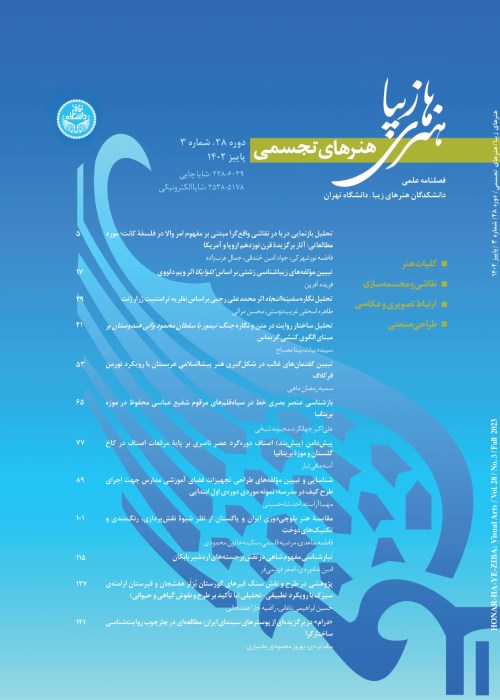Examining Paul Ricoeur's Hermeneutics and Interpretation of Audience from the Artistic work through Relying on Title*
Author(s):
Abstract:
In the swarm of artistic transformations in 20th century، works of painting also have got different «titles». In examining these titles، through passing the reasons for choosing them the role of title is introduced in encountering the audience and the way of affecting on the interpretation of audience. This research also tries to study about these influences through Ricoeur''s hermeneutics. Ricoeur explicitly states that the first realm that hermeneutics takes the responsibility to represent is the language. It is the language that allows us to talk about arts. In defining the language Paul Ricoeur is influenced by Emile Benveniste and stays away from structuralism. Like Emile Benveniste، Paul Ricoeur considers the language based on discourse; accordingly، each work of art is a discourse which conveys a message، and reveals an aspect of reality through the conversation with the audience. By presenting artistic work as discourse، audience and text are more important than author، and meaning of the work only becomes complete in action of interpretation by audience. Work refers to a world that encounters the world of audience، and audience by passing through stages of Ricoeur’s interpretation، that is، explanation، understanding، and self- understanding، interprets the work، in other words، the audience reaches the meaning. One can consider a role for title in this process which starts with explanation of the work، and finally ends up in self-understanding. Title can be considered as a part of the author''s strategy and can create meaning innovation through functions such as metaphor or plot innovation. In fact in the reading action of audience، title can give refiguration of the work to audience till audience can recreate meaning of the work in each interpretation and turns configuration of the work. As the painter of the 20th century demands the audience semantic innovation so that with the assistance of painting interlude and its title، the audience won’t be the inactive consumer of the thoughts of the creator of art anymore، but he should have participated in creating the meaning of the work by himself. Titles often play an important role in relation to the audience’s interpretation ever since the modern art. In modern painting، due to multiplied importance of structure of the art work for its creator، the narrative fades out and the titles get metaphorical function. Such a function could be seen during this period، particularly in the titles selected by Dadaists and Surrealists due to their particular perception of language. However، through transition from modern art to post modernism and with increasing importance of narrative، audience، and audience’s interpretation، the titles in postmodern paintings function more to devise plot because the artist’s strategy demands the audience to recreate the configuration of the work and to make his own interpretation via his contribution to plot invention. Procedure of this research was development-applied in terms of objective، and also، this research used a descriptive and comparative-analytic method، and data collected by library method were finally qualitatively analyzed logic and argument.
Keywords:
Audience , Interpretation , Painting , Paul Ricoeur , 20th Century , Title
Language:
Persian
Published:
Journal of Fine Arts, Volume:19 Issue: 3, 2014
Pages:
19 to 26
magiran.com/p1457766
دانلود و مطالعه متن این مقاله با یکی از روشهای زیر امکان پذیر است:
اشتراک شخصی
با عضویت و پرداخت آنلاین حق اشتراک یکساله به مبلغ 1,390,000ريال میتوانید 70 عنوان مطلب دانلود کنید!
اشتراک سازمانی
به کتابخانه دانشگاه یا محل کار خود پیشنهاد کنید تا اشتراک سازمانی این پایگاه را برای دسترسی نامحدود همه کاربران به متن مطالب تهیه نمایند!
توجه!
- حق عضویت دریافتی صرف حمایت از نشریات عضو و نگهداری، تکمیل و توسعه مگیران میشود.
- پرداخت حق اشتراک و دانلود مقالات اجازه بازنشر آن در سایر رسانههای چاپی و دیجیتال را به کاربر نمیدهد.
In order to view content subscription is required
Personal subscription
Subscribe magiran.com for 70 € euros via PayPal and download 70 articles during a year.
Organization subscription
Please contact us to subscribe your university or library for unlimited access!


